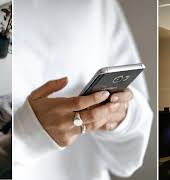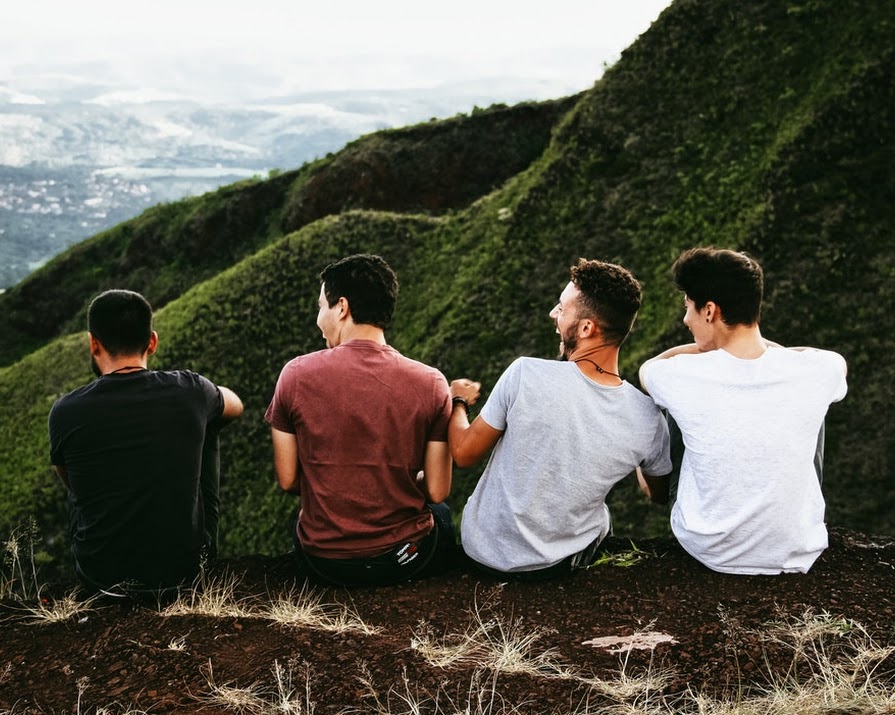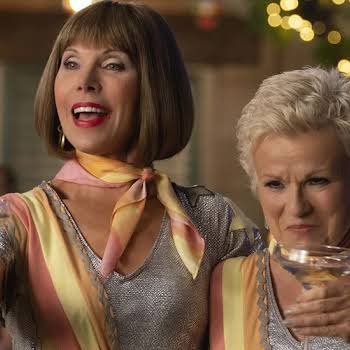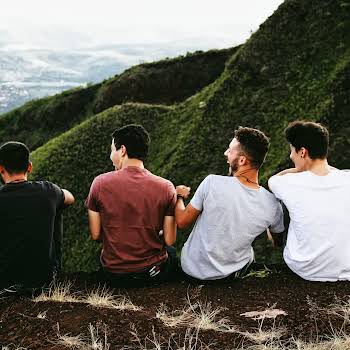
By Erin Lindsay
19th Nov 2018
19th Nov 2018
Today (November 19th) is International Men’s Day. This may be the first you’ve heard about it. While International Women’s Day (March 8th, in case you were wondering) sparks week-long celebrations, the male equivalent is rarely talked about, much less memorialised with parties and think-pieces. Why is that?
The main reason, as far as I can see, is the same reason that we have the day in the first place; men don’t talk about themselves enough. I can hear the mass sound of angry clicks as people exit this piece already, but hear me out.
I don’t mean that men don’t talk about themselves in one sense — their achievements, their opinions on social issues, their talents, their arguments — God knows some men can talk about this stuff til the cows come home.
I mean that men don’t talk about themselves; their real, vulnerable selves. Fears, hang-ups, insecurities, worries, emotions, mental health. When these are the topic of conversation, men are distinctly quiet.
Gender roles
Toxic masculinity is a particularly sinister symptom of living in a largely patriarchal society. Both men and women are encouraged to obey traditional gender roles, with men being the ‘protectors’ and ‘breadwinners’ and women playing the role of a subservient mother and wife.
While women have, through decades of pushing against the patriarchy, begun to break down the restraints of traditional feminity and carved a space that is more open (with still decades more progress to go), men have been left wondering where they stand in this new world. If they are no longer needed as traditional ‘protectors and breadwinners’, then where do they go from here?
I’m reminded of a speech by renowned mental health advocate Blindboy on the Late Late Show back in 2016, when he shared his experiences of speaking with young men about their biggest fears and concerns. The consensus was that young men worried about their relevance to women. If a woman can provide for herself and be independent, then what can a man possibly offer her? The answer is simply himself; because that is, and is always, enough.
There's a crisis in young men in this country – they need feminism – @Rubberbandits' Blindboy Boatclub #latelate https://t.co/EAyDw9q1eQ
— RTÉ One (@RTEOne) November 18, 2016
Male mental health
The fact is that men are struggling, whether they like to talk about it or not. While Ireland generally has a very poor record when it comes to how we handle mental health, there has been a crisis in recent years in male mental health.
Men account for almost 80 per cent of suicides in Ireland, according to a 2017 report by the National Office for Suicide Prevention. Men are four times more likely to die by suicide than women. Socio-economic factors and proximity to resources and jobs can be observed in the figures — the highest rates of suicide in the report were recorded in Limerick city, Roscommon and Cavan, with the lowest rates in Dún Laoghaire— Rathdown, Waterford City and Fingal.
While 1 in 5 of us will suffer from depression at some point in our lives, men are much less likely to seek support and talk about their mental health than women. Men need to be given a space in which to speak honestly about their emotions, and not be tied down by stigma and toxic male stereotypes.
Last year, a thread on Twitter showed what happens when men feel secure enough to discuss their emotions and mental state. The author and columnist Caitlin Moran posted a single tweet asking men about “the downsides of being a man”; what men regularly struggle with, and how they feel in themselves.
From her single tweet, which was encouraging, warm and non-judgemental, almost seven thousand men responded, opening up about what they deal with when it comes to being a guy. Responses ranged from pressure to be ‘masculine’ to insecurities about their physical appearance to self-doubt to depression — all valid problems, all going unheard until then.
I'm a large dude. I'm acutely aware of how uncomfortable I can make women when walking down the street at night, or waiting for public transportation. I don't mean to or want to, so I just do what I can to be as un-threatening as possible.
— Barl0we (@Barl0we) October 19, 2018
Sometimes I want to show the other men in my life how dearly I love them, with words, hugs, letters, etc., but it feels like a physical wall prevents me from expressing myself so freely.
— Nicolás Machurro (@nnnnnicolas) October 19, 2018
A lack of resources and support for male domestic abuse and sexual violence victims. There's not a lot out there, and that which does exist often don't seem to cater for those of us who are LGBTQ+ and/or were victimised as children/teens
— Tristan Oscar Smith ?? (@tristanoscars) October 19, 2018
Where do we go from here?
When I visualise the men in my life, I see funny, kind, intelligent, thoughtful, generous people — I don’t think about their roles as protectors, or what they can do for me. It is enough for me to just get to enjoy them as a part of my life. To all the men who might not know where to start in celebrating International Men’s Day — you’re fabulous, you’re worthy and you deserve to look after yourself.






















